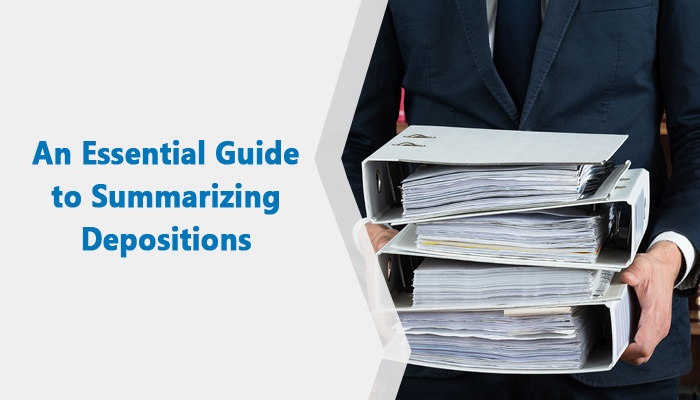Depositions are pivotal in legal proceedings, acting as a primary information source for attorneys and the court. Mastering the art of summarizing depositions effectively is a skill that can empower every legal professional. Let’s delve into this comprehensive blog for more insights:
What are Depositions?
A deposition is a fundamental procedure within the legal process. Here, a witness or a party is questioned under oath by an attorney. It happens outside the courtroom, serving as a crucial pre-trial discovery tool, enabling lawyers to gather testimony. This testimony, in written form, becomes vital evidence well before the actual trial.
The primary objectives of depositions consist of collecting information, identifying key witnesses, and assessing the case’s strength.
Furthermore, depositions help in preserving crucial testimony. It is when a witness may become unavailable to testify during the trial proceedings.
The deposition process is typically initiated by serving a notice of deposition upon the intended witness or party to be deposed.
Subsequently, the concerned individual must appear at a designated time and location, where they are subjected to a comprehensive series of questions under oath.
The attorney conducting the deposition possesses the prerogative to pose any pertinent questions, and the witness, in turn, is responsible for providing truthful responses.
A court reporter is typically present to record and transcribe the deposition into a meticulously crafted written transcript to ensure an accurate record of the proceedings. This transcript holds immense significance in the legal proceedings that follow.
What are the criteria for summarizing depositions?
There are two essential criteria that determine summarizing deposition accurately: legal acumen and potential to summarize.
Every trial bears a distinct set of facts that require its course of trial. The testimony anticipates the elements associated with it. In deprivation of legal acumen, the crucial details of testimony are at risk if you overlook them.
Experienced lawyers can make the selection of valuable text out of the deposition efficiently. Any person apart from a lawyer or paralegal might possibly be struggling to realistically recognize and determine the essential part in the testimony to back up the defense or otherwise.
Is Summarizing Deposition Time-Consuming?
For professionals, summarizing deposition transcripts, also known as digesting them, can be quite challenging and expensive in terms of both time and client costs. For example, summarizing a 200-page deposition transcript can easily take up to 8 hours for a litigation paralegal.
The duration of this process depends on factors such as the complexity of the case, whether the deponent is a witness or a lay witness, the specific type of deposition summary being prepared, your knowledge of the case, and your previous experience in summarizing deposition transcripts. Now imagine having to summarize not one but a whopping 20 deposition transcripts.
But what value does a deposition summary actually bring to the case?
To answer that question, it’s crucial to understand the purpose behind creating a deposition summary. In today’s landscape, things have advanced significantly since the 1990s.
We now have access to cutting-edge litigation technology that allows us to conduct full-text searches across all deposition transcripts and online repositories. This greatly enhances our ability to locate testimony quickly.
Nevertheless, in today’s practice, numerous legal experts are still responsible for analyzing deposition transcripts. If you find yourself in this group, it would be beneficial to contemplate the benefits of outsourcing service providers. They can help streamline your workflow and enhance the efficiency of your case preparation process.
How to Write Deposition Summaries Efficiently
Therefore, the responsibility of an individual with legal acumen ends up being imperative in emphasizing the selected part. The legal acumen in summarization deposition necessitates the following expertise:
- Capability to recognize the main points associated with the testimony available
- Ability to understand the legal points lightly to be reinforced or eradicated by the witness
- Picking out the main points inclusive of the supported/non-supported variation by the witness
Read Also: Document Review Services- The Most Daunting Step Of Litigation
Legal Support World offers top-notch litigation support services to clients worldwide. Our summaries create a workforce of skilled summarizers consisting of attorneys, paralegals, and specialist writers.
We cautiously trim down testimony to facts, cautiously keep track of dates, statistics, names, and exhibits, provide an archive of fundamental events and actions, clear away unrelated data, and arrange subject material into logical paragraphs.
If you are planning to outsource deposition summary services, get in touch with us today. We offer a free trial to all our clients.


